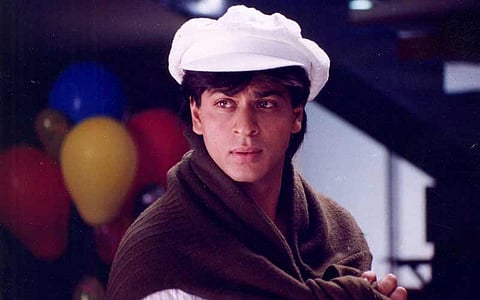
- Reviews
- Power List 2024
- Cannes 2024
- In-Depth Stories
- Web Stories
- News
- FC Lists
- Interviews
- Features
- FC SpecialsFC Specials

My earliest and strongest recollection of a song that always brings back fond memories and I absolutely love is Yeh Dil Deewana from Pardes. Composed by Nadeem-Shravan and written by the legendary Anand Bakshi, what hooked me to the song was the tune and how much my mother and I enjoyed it. I remember watching it enchanted by the visuals of an open sports car (I was a Hot Wheels fanatic) speeding across the desert and a floppy haired Shah Rukh Khan adding his manic energy to the visuals. Even though the song is about unrequited love and the ache that comes with it; the lines 'maine dil se usse nikala, jo na karna tha kar daala, phir bhi yaad usi ko karta hai yeh dil' are a testament to that, it in a subliminal manner also has a life lesson somewhere in the importance of letting go.
The song structure cleverly builds to this and the languidness that Bakshi ji gives to it with his verses is nothing short of magical. It begins with the unrequited portion, moves in the second stanza to support it and ends with the idea of how moving on is necessary. The flow is so natural that once you realize the meaning, the appreciation for the lyrics doubles up. The song also introduced me to words that intrigued me because they were alien (also to do with the fact that I was young) and laid the foundation for my love to pickup new languages. I speak Bengali at home and grew up in Lucknow, so words from a mix of Urdu and Hindi like 'bepir', 'zanjir', 'khata', 'gila' etc. became regular in conversations as the understanding for the languages grew. Of course the lehza that I was surrounded with in normal life helped me absorb even more.
https://www.youtube.com/watch?v=2228O5t62VQ
The song has over time turned into different things at different junctures of life for me, being a constant companion throughout. While I did not have the maturity to fully grasp the grammar of the song then, I have grown to understand the different words and lines and their inherent intention within the piece. For instance in my teenage years, the lines 'dil kaisa bepir hai, woh ek tasvir hai, main kehta hu tod de, kehta ek zanjir hai' became an escape vent for my frustrations over not understanding 11th standard Physics. It then slowly morphed into my companion on drunken night with friends in college who had similar shared experiences; broken hearts, no money but having plenty of fun in a time when falling in love happened rather quickly where the line 'aashiq hai yeh chor nahi hai main kya karu, dil pe mera zor nahi hai main kya karu' made all the more sense. But, above all it reminds me of the absolutely wonderful time that I spent with my mother singing and dancing on the song. It was a time that was physically difficult for her and the song eased that. It made her forget momentarily about how careful she needed to be and it allowed me to be a silly kid who enjoyed with her and fell in love with the smoothness of Sonu Nigam's voice .
The song reminds me of that time when life was uncomplicated. 'Stress' was a word yet to be introduced in my vocabulary, playing cricket was the most intense activity of the day and having my mother around was taken for granted and who despite her difficulties was always ready to indulge my silliness and inquisitiveness. Even today the song provides me that familiar comfort feeling by making me sweetly nostalgic of the time with Maa but also nudges me to accept fate and its bittersweet nature.